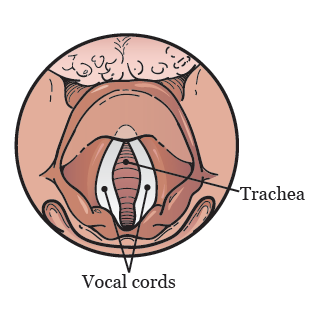Which Term Describes Paralysis of the Larynx
Vocal fold immobility is a broad term that can be used to describe the abnormal movement of the true vocal folds. What is the medical term meaning paralysis of the larynx.

Vocal Cord Paralysis Memorial Sloan Kettering Cancer Center
Laryngeal Paralysis Holistic Protocol for Dogs has been developed by a certified Master Herbalist and certified Canine Nutritionist with The Pet Health and Nutrition CenterOur Laryngeal Paralysis Protocol is the finest coordination of science and research-based recommendations that include diet supplementation and herbal remedies to help support your dog with laryngeal paralysis.

. The loss of the ability of the larynx to produce normal speech sounds describes_____. It can be a congenital condition of young dogs or may be due to a neuromuscular disease in older dogs. The term meaning the surgical repair of the trachea is _____.
Some dogs are born with congenital laryngeal paralysis. Damage to the recurrent laryngeal nerve can result from diseases inside the chest intrathoracic diseases such as a tumor or an aneurysm ballooning of the arch of the aorta or of the left atrium of the heart. Partial paralysis of the larynx is a term often used to describe a hypomobile vocal fold as is the term paresis.
Which of the following is the correct sequence for. Partial paralysis of the larynx is a term often used to describe a hypomobile vocal fold as is the term paresis We present a case of a dysphonic patient with a mobility disorder of the vocal fold for whom idiopathic partial paralysis was the diagnosis made after laryngeal electromyography and discuss a proposition for a different implementation of the term. The term laryngeal neuropathy LN has first been used in veterinary medicine to describe an idiopathic and typically exercise induced inspiratory noise in horsesNowadays the term is often used in relation with intermittent vocal cord pareses in humans.
The clinical signs of laryngeal paralysis can vary widely and be quite subtle. Some authors use the term irritable larynx syndrome ILS in a similar context. Laryngeal paralysis is the term used to describe a functional failure of the larynx voice box particularly a failure to open the vocal cords during inspiration breathing in.
The term Geriatric Onset Laryngeal Paralysis and Polyneoropathy GLOPP has been applied to describe these findings. Another term might be vocal cord paralysis. Laryngeal paralysis in dogs is a condition where the nerves and muscles responsible for controlling the movements of the arytenoid cartilages of the larynx stop functioning as they should.
This review will focus specifically on unilateral vocal fold paralysis. As a result speech and vocalization function can be severely impacted. It can be unilateral where only one true vocal fold is affected or bilateral in which both true vocal folds are affected.
The primary larynx-related functions of the mainly efferent nerve fiber RLN include the. This results in upper airway obstruction because of interference with airflow particularly during inspiration. Vocal cord paresis also known as recurrent laryngeal nerve paralysis or vocal fold paralysis is an injury to one or both recurrent laryngeal nerves which control all muscles of the larynx except for the cricothyroid muscle.
Clinical signs include coughing noisy breathing exercise intolerance and there may be a change in the sound of the bark. Laryngeal paralysis is probably more common than is diagnosed. Resulting from paralysis of the laryngeal nerve which innervates the intrinsic laryngeal muscles vocal fold paralysis VFP is the result of a number of conditions including head or neck injury stroke tumors infections or other neurological issues.
Which term means paralysis of the vocal bands. 1588-90 It is a common form of upper airway obstruction generally recognized in middle-age to older large and giant breed dogs. The term commonly known as shortness of breath is _____.
The consequence is damage to the recurrent laryngeal nerve is laryngeal palsy paralysis of the larynx the voice box on the affected side. Laryngeal paralysis is the result of recurrent laryngeal nerve dysfunction that impairs arytenoid cartilage abduction during inspiration leading to respiratory stridor and distress. Laryngoparalysis or laryngoplegia is paralysis of the larynx or voice box.
The RLN is important for speaking breathing and swallowing. In a normal healthy dog the arytenoid cartilages of the larynx will open when the dog inhales and close when the dog swallows during eating and drinking so to. Laryngoparalysis or laryngoplegia is paralysis of the larynx or voice box.
9091 Some studies suggest that Labrador Retrievers are overrepresented. Laryngeal paralysis is a condition that causes dysfunction of the larynx causing reduced ability to breathe deeply and can obstruct the airway. Loss of vocal fold mobility.
Common causes include surgical trauma to the recurrent laryngeal nerve or invasion of the nerve by a tumor. Recent studies have led to the conclusion that most dogs with idiopathic laryngeal paralysis have a neuromuscular disease and that this is one of the first signs of the disease. Laryngeal paralysis is the failure of the arytenoid cartilages to properly abduct secondary to muscle or nerve damage.
This article reviews the state of. A new term geriatric onset laryngeal paralysis and polyneuropathy GOLPP has been developed to describe this. Another term might be vocal cord paralysis.
Partial paralysis of the larynx is a term often used to describe a hypomobile vocal fold as is the term paresis We present a case of a dysphonic patient with a mobility disorder of the vocal fold for whom idiopathic partial paralysis was the diagnosis made after laryngeal electromyography and discuss a proposition for a different implementation of the term.


No comments for "Which Term Describes Paralysis of the Larynx"
Post a Comment